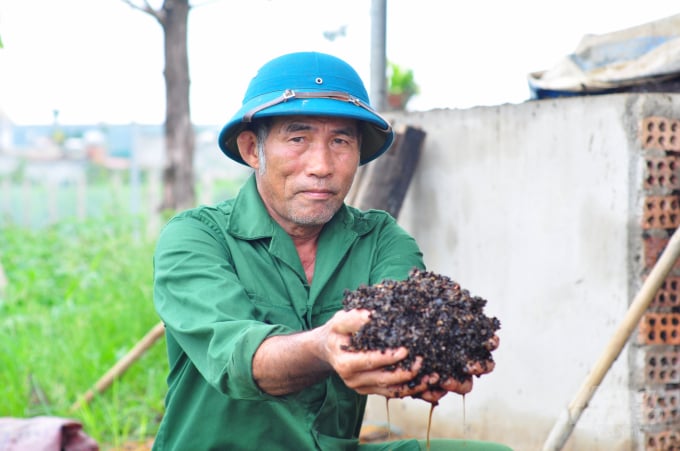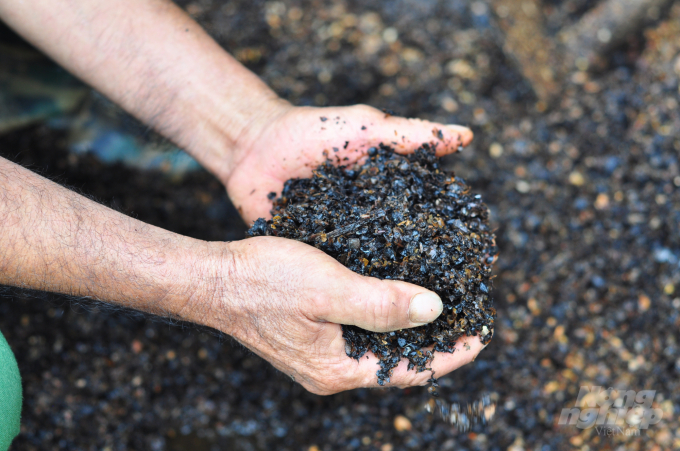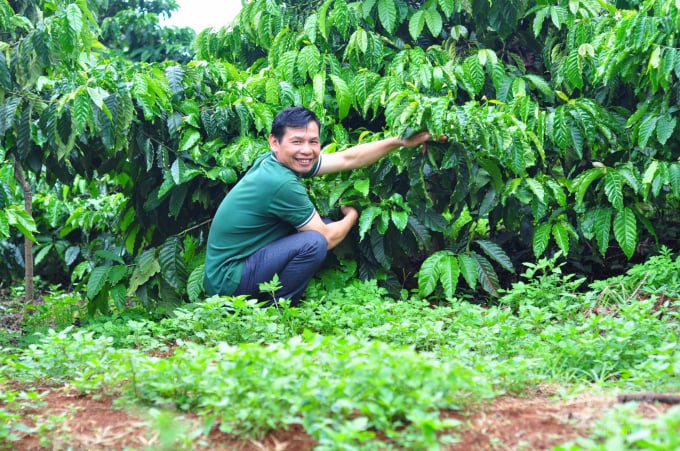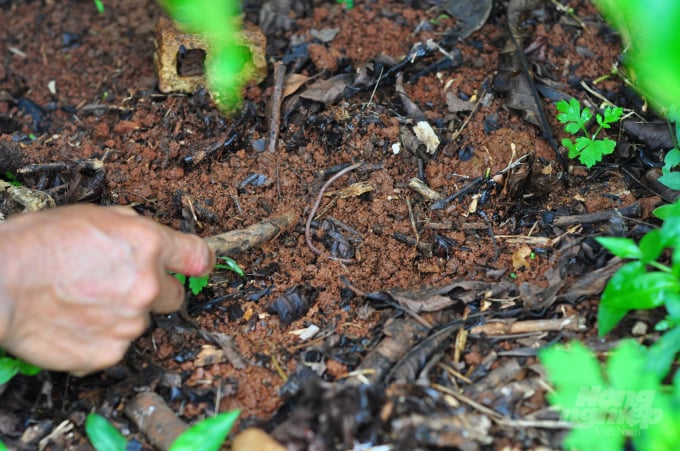November 21, 2025 | 13:34 GMT +7
November 21, 2025 | 13:34 GMT +7
Hotline: 0913.378.918
November 21, 2025 | 13:34 GMT +7
Hotline: 0913.378.918

To reduce input costs, Mr. Bach Van Pha's family self-composts organic fertilizer to fecundate coffee. Photo: Minh Hau.
Over the years, although the price of coffee has dropped, with their way to reduce input costs, the family of Mr. Bach Van Pha, Tan Van commune (Lam Ha district, Lam Dong province), still maintain a good source of income and earn high profits.
“In the past, the family still used chemical fertilizers to grow coffee. In the beginning, the tree grew strongly, but later on, the garden soil gradually dried up, so the trees also declined, and the yield was poor. It was not until 2019 when an agricultural expert analyzed and instructed how to self-compost organic fertilizer, did the coffee cultivation really achieve high results”, shared Mr. Pha.
According to Mr. Pha, the fertilizer that he composted and used for his garden is mixed from many materials, which include main ingredients such as coffee husks, agricultural by-products, Trichoderma probiotics, cane sugar...

Mr. Bach Van Pha uses coffee husks, by-products and probiotics to make fertilizer. Photo: Minh Hau.
According to Mr. Pha, in Lam Ha area, many families still focus on coffee production in the form of using a variety of chemical fertilizers. The majority of people use 3 types of fertilizers such as potassium, phosphorus, SA mixed together to fertilize the plants.
The long-term abuse of chemical fertilizers will lead to degraded soil, affected soil and water environment. More importantly, the investment costs for these fertilizers are many times higher than the application of manure and compost from agricultural waste.
Mr. Pha said: In recent years, the coffee price has continuously decreased, at just around VND 30,000/kg kernel. As a result, many families who sell products could not afford the cost of fertilizer, subsequently fell into difficult situations. Thanks to the application of reducing input costs, self-composting to fertilize, his family still made hundreds of millions of VND profit.
His family determined that coffee is still the main crop of the family and the garden is highly productive, so he does not intercrop like other families. Every year, his family collects tens of tons of kernels. “In 2020, with 5.7ha of coffee (including newly replanted and old areas), the family collected 27 tons of beans. After deducting all kinds of expense, there is about VND 400 million left”, he shared.

Mr. Tran Van Xuat's family maintains grass on the garden floor to create an ecosystem for the soil. Photo: Minh Hau.
In Nam Ban town (Lam Ha district, Lam Dong), the family of Mr. Tran Van Xuat (53 years old) is also cultivating stably with an area of over 2.5 hectares of organic VietGAP coffee intercropped with avocado. Mr. Xuat has been growing coffee since 1998 and also used to develop in the form of applying chemical fertilizers to improve production.
"In the past, I used a lot of chemical fertilizers, so the soil was hard, it was so difficult to dig. Now I use a lot of manure, a lot of organic fertilizer, so the soil is very loose. Worms, crickets, ants... also develop a lot thanks to that, contributing to making the garden more porous".
According to Mr. Xuat, his family produces in the direction of using 2 parts of manure, microbial organic fertilizer, the remaining part is soluble fertilizer to fertilize through the economical irrigation system.
As for the maintenance of the garden grass, in the past, Mr. Xuat thought that if the grass was too much, they would absorb all the nutrients of the plant, but actually not to that extent. Weeds can absorb nutrients in the coffee tub, but in return, they also contribute to maintaining the soil temperature and humidity.
In particular, the dead leaves and stems of the grass also become a layer of decaying mats to better the soil. Therefore, he did not kill the weeds, but only middle-cut the stem. The cut-off stem also fell to the garden floor and he left it as a natural fertilizer.

Applying the organic production process makes the garden floor porous, worms, crickets and many kinds of insects proliferate. Photo: Minh Hau.
“The biggest success so far has been creating a clean garden, a clean product. The happier thing is that the made products are also more expensive," said Mr. Tran Van Xuat excitedly.
Having applied the direction of organic production in recent years, Mr. Xuat's family has not used chemical pesticides. Instead, he sought to stimulate natural enemies such as ants, bees, etc. to grow and protect crops.
In the beginning, the application of this model caused Mr. Xuat's garden to be degraded by pests and less productive than gardens using chemicals. However, up to the present date, the garden is basically free of pests and diseases, and the trees grow well, attaining a high yield.

(VAN) Results from the Sustainable Durian Model Project in Dak Lak have confirmed the critical role of Yara Viet Nam in transferring advanced nutritional solutions to farmers.

(VAN) In Tuyen Quang province, livestock farmers have introduced effective models and innovative practices that significantly strengthen African Swine Fever prevention and control efforts.

(VAN) This is the study conducted by IRRI and Can Tho University on the rice straw value chain in Mekong Delta showing an economic potential of more than 6.6 trillion VND/year.

(VAN) By participating in cooperative economics, many farmers in Tay Ninh have overcome hardship, mastered clean dragon fruit cultivation techniques.

(VAN) The crossbreeding program in the former Binh Dinh province (now part of Gia Lai) has shown signs of decline, and urgent measures are needed to revive it and sustain past achievements.

(VAN) The agricultural sector agreed on a roadmap to pilot the MRV protocol and expand low-emission rice production from the 2025-2026 winter-spring crop.

(VAN) Agricultural extension officers in Quang Ninh do more than transmit knowledge; they have become a steadfast support system for farmers on the path to sustainable agricultural development.